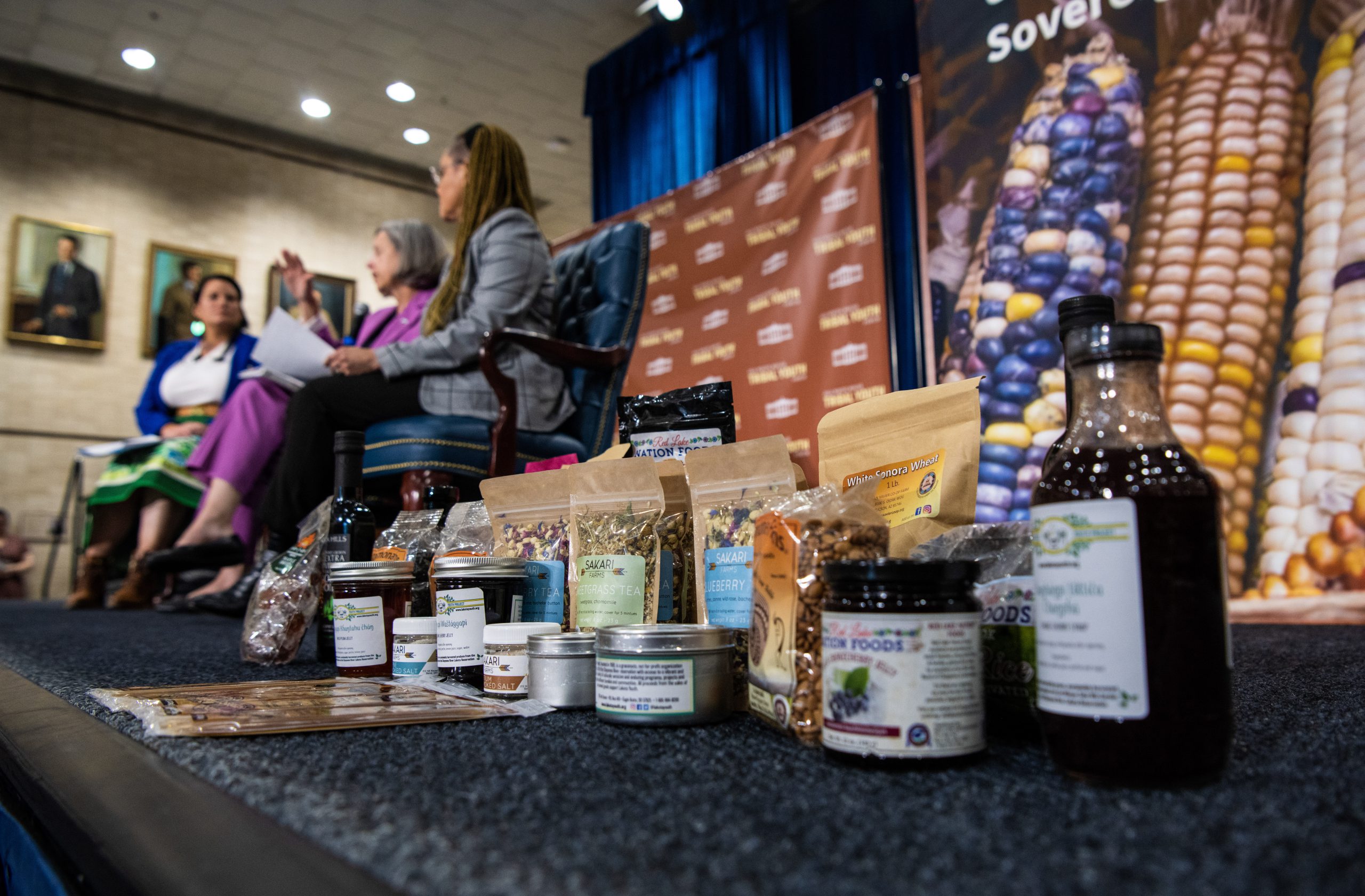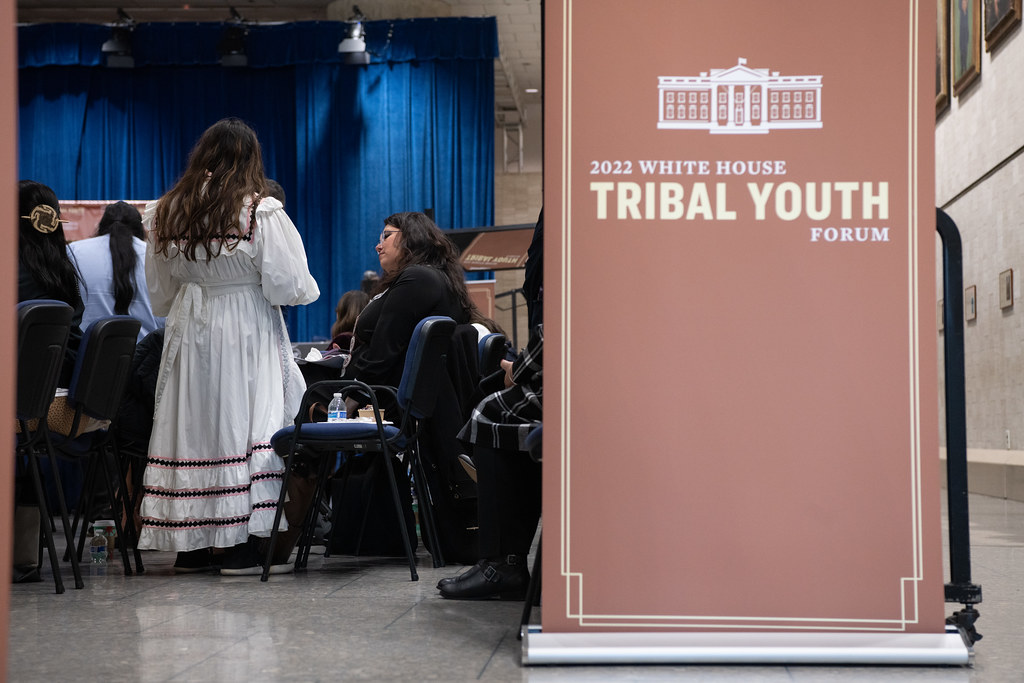Indianz.Com > News > USDA promotes Indigenous Food Sovereignty Initiative

USDA Announces New Resources to Empower Indigenous Food Sovereignty
Tuesday, November 15, 2022
Indianz.Com
The following is the text of a November 14, 2022, news release from the Department of Agriculture.
WASHINGTON, D.C. — U.S. Department of Agriculture (USDA) Secretary Tom Vilsack today announced new resources and new agreements of the USDA Indigenous Food Sovereignty Initiative, which promotes traditional food ways, Indian Country food and agriculture markets, and Indigenous health through foods tailored to American Indian/Alaska Native (AI/AN) dietary needs. USDA is partnering with tribal-serving organizations on these projects to reimagine federal food and agriculture programs from an Indigenous perspective and inform future USDA programs and policies. The USDA Food Sovereignty Initiative was one of several efforts announced at the 2021 White House Tribal Nations Summit to better serve tribal governments, citizens, and organizations.
“USDA is committed to empowering tribal self-determination and bringing Indigenous perspectives into agriculture, food, and nutrition,” said Secretary Vilsack. “These new videos, publications, and guides will support Indian Country and educate the wider agriculture community.”
White House Tribal Youth Forum

- A users’ manual for interested ranchers titled “Transitioning from Cattle to Bison,” created in partnership with Intertribal Buffalo Council (ITBC).
- Regional Seed Saving Hubs created in partnership with Native American Food Sovereignty Alliance Indigenous Seed Keepers Network (ISKN). Six seed cleaning/fanning mills were purchased and distributed to help establish regional Indigenous seed hubs in the Midwest region and Southwest/Western region.
- Twelve videos on foraging wild and Indigenous plants, produced in partnership with foraging and ethnobotany experts Linda Black Elk, Lisa Iron Cloud (Oglala Sioux), and Addelina Lucero (Taos Pueblo/Yaqui). The videos highlight how sustainable foraging practices can increase nutrition security and promote sustainable Indigenous foods. These videos look at foraging in the Midwest, Mountain Plains, and Southwest regions.
- Twelve recipes and instructional cooking videos using Indigenous foods. The recipes and videos show ways to integrate foraged and Indigenous foods with foods available through USDA’s Food Distribution Program on Indian Reservations (FDPIR). In partnership with the North American Traditional Indigenous Food Systems (NATIFS), the videos feature award-winning chefs and restaurateurs Chefs Sean Sherman (Oglala Sioux) and Crystal Wahpepah (Kickapoo Tribe of Oklahoma). The recipes and videos focus on foods in the Midwest, Mountain Plains, and Southwest/West regions.
- USDA will partner with Native Realities media company and Dr. Lee Francis (aka Indigi-Genius) to produce “Sovereignty Gardens,” a short form digital media series combining puppetry, animation, and live action video to engage Native youth in food sovereignty and gardening.
- USDA will partner with new foragers and new chefs to create additional recipes and videos on foraging and cooking Indigenous foods for the Northeast and Southeast regions.
- USDA’s Agricultural Research Service (ARS) will partner with two tribal land grant colleges (Nueta Hidatsa Sahnish College and United Tribes Technical College) on Great Plains Indigenous seeds and plants research. This research centers around Indigenous Traditional Ecological Knowledge (ITEK).
- USDA will partner with Intertribal Buffalo Council (ITBC) to produce a handbook on the best practices for the humane handling and harvesting of bison in the field, a hands-on curriculum and training focused on food sovereignty and food safety of bison field processing, and a model for a mobile bison field processing trailer.
USDA touches the lives of all Americans each day in so many positive ways. Under the Biden-Harris Administration, USDA is transforming America’s food system with a greater focus on more resilient local and regional food production, promoting competition and fairer markets for all producers, ensuring access to safe, healthy and nutritious food in all communities, building new markets and streams of income for farmers and producers using climate-smart food and forestry practices, making historic investments in infrastructure and clean energy capabilities in rural America, and committing to equity across the Department by removing systemic barriers and building a workforce more representative of America. To learn more, visit usda.gov.
Search
Filed Under
Tags
More Headlines
Native America Calling: Tribes vie for better access to traditional plants
Senate committee schedules confirmation hearing for Interior nominee
Fact Sheet: Department of Health and Human Services to undergo ‘dramatic restructuring’
Press Release: Department of Health and Human Services to undergo ‘dramatic restructuring’
Native America Calling: The new Social Security reality for Native elders
Montana Free Press: Hip-hop artist Foreshadow celebrates latest release
Cronkite News: Bill creates alert system for missing and murdered relatives
Bureau of Indian Affairs approves HEARTH Act regulations for Mohegan Tribe
House Subcommittee on Indian and Insular Affairs sets field hearing for self-determination anniversary
Native America Calling: Sometimes, COVID doesn’t go away
Native America Calling: The changing landscape for subsistence hunting and fishing
Press Release: AIHEC ‘deeply concerned’ about closure of Department of Education
Press Release: Oklahoma Indian Gaming Association weighs in on sports betting legislation
Press Release: Sen. Mike Rounds (R-South Dakota) calls for commission on crime in Indian Country
Press Release: Sen. Schatz (D-Hawaii) criticizes closure of Department of Education
More Headlines
Senate committee schedules confirmation hearing for Interior nominee
Fact Sheet: Department of Health and Human Services to undergo ‘dramatic restructuring’
Press Release: Department of Health and Human Services to undergo ‘dramatic restructuring’
Native America Calling: The new Social Security reality for Native elders
Montana Free Press: Hip-hop artist Foreshadow celebrates latest release
Cronkite News: Bill creates alert system for missing and murdered relatives
Bureau of Indian Affairs approves HEARTH Act regulations for Mohegan Tribe
House Subcommittee on Indian and Insular Affairs sets field hearing for self-determination anniversary
Native America Calling: Sometimes, COVID doesn’t go away
Native America Calling: The changing landscape for subsistence hunting and fishing
Press Release: AIHEC ‘deeply concerned’ about closure of Department of Education
Press Release: Oklahoma Indian Gaming Association weighs in on sports betting legislation
Press Release: Sen. Mike Rounds (R-South Dakota) calls for commission on crime in Indian Country
Press Release: Sen. Schatz (D-Hawaii) criticizes closure of Department of Education
More Headlines